
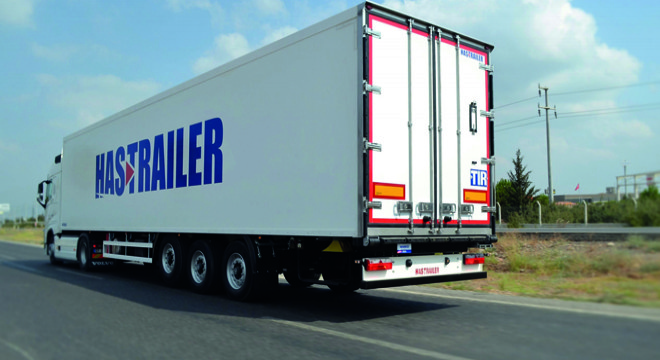
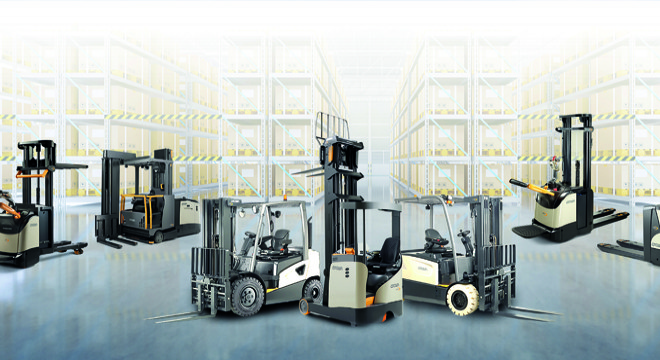
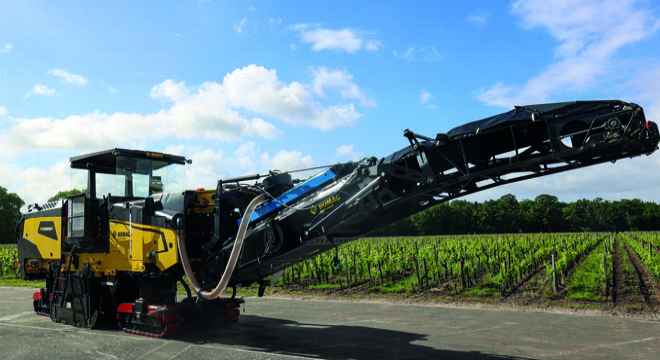
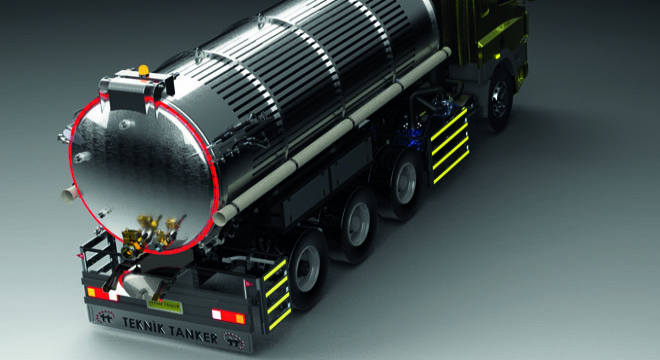
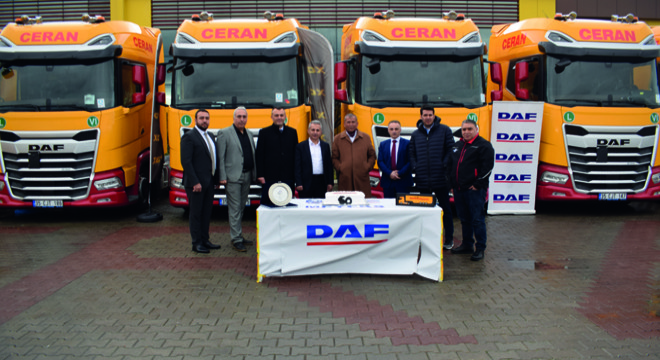
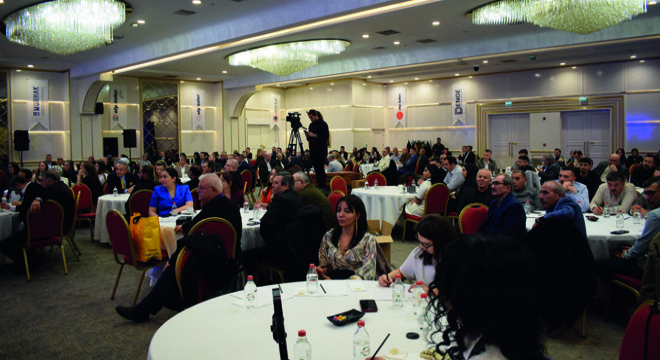
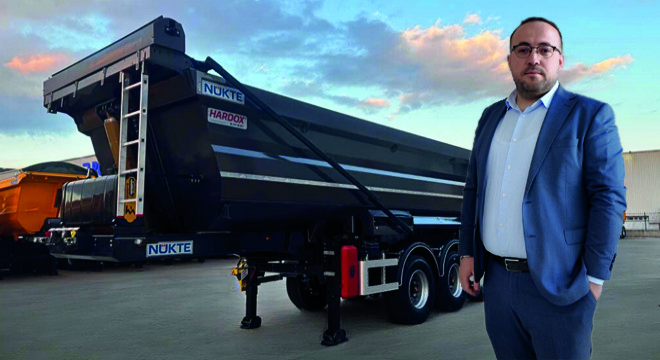
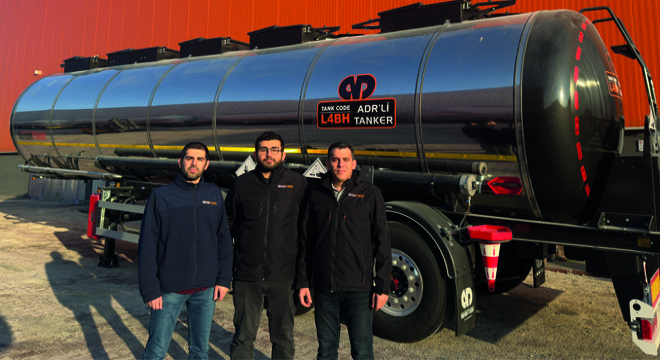
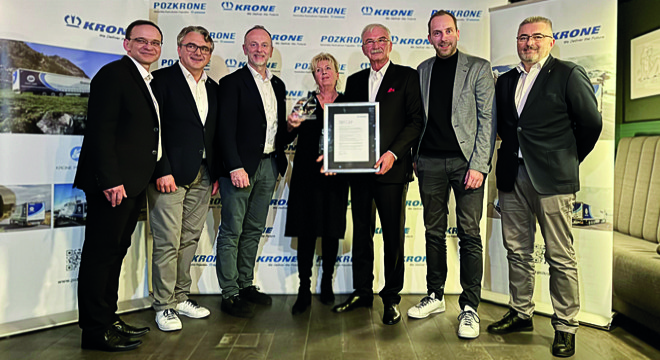

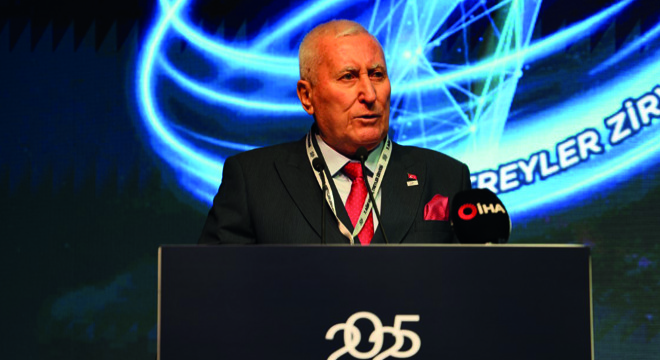
“Those who produce in Turkey are winning!” said Şentürk, underlining that Turkey has significant potential to become a major logistics and production hub. He also emphasized that they are once again striving to become “Europe's Manufacturing Hub.”
Şentürk stated that Turkish trailer manufacturers, who export to 70 countries, are aiming for one billion dollars in exports.
Şentürk noted that 2024 has been a challenging year for Turkish industry and pointed out that the entire world is undergoing a tough transformation process, stressing the need for the Turkish trailer industry to rapidly adapt to this change.
Addressing the sector's main problems and related efforts, Şentürk mentioned that some of their top priorities include combating counterfeiting and unregistered production, and implementing a scrap incentive program. Şentürk also described the lack of access to credit for their products as “A Bleeding Wound!”
“We Became Europe’s Largest Domestic Market in 2023”
“We Are Europe’s Second Largest Manufacturer”
Starting his remarks with an evaluation of the Turkish trailer market in 2023 and 2024, Şentürk stated that in 2023, Turkey had the largest domestic trailer market in Europe. Although the 2024 figures for Europe are not yet finalized, Şentürk noted that Turkey remains among the top two. In terms of production, he added that with a capacity of 100,000 units and an output of 50,000, Turkey is the second largest trailer manufacturer in Europe.
“Our Goal Is to Achieve One Billion Dollars in Exports!”
“Those Who Produce in Turkey Are Winning!”
Şentürk stated that Turkish trailer manufacturers, who export to 70 countries, achieved a record-breaking export figure of 777 million 402 thousand dollars in 2023. In 2024, however, he noted a 13.8% decrease, with total exports amounting to 670 million 91 thousand dollars. Şentürk emphasized that their goal is to reach one billion dollars in exports in the near future.
Adding that European sub-industry suppliers prefer to manufacture in Turkey alongside producers, Şentürk said that: “Because those who produce in Turkey are winning.”
“Trailer Manufacturers Have Reached a Production Capacity of Approximately 40,000 Units”
“Turkey Has the Potential to Become a Major Logistics and Production Hub”
Stating that the increase in global trade volume and the expansion of international logistics networks have continuously boosted demand for the trailer sector, which is one of the most critical elements of commercial transportation, Şentürk continued his remarks as follows: “Thanks to its industrial infrastructure, geographical location, and production capacity, Turkey has the potential to become a major logistics and production hub in Europe, the Middle East, and North Africa (MENA). Trailer production in Turkey gained momentum starting from the 2000s, and since 2010, the sector has entered a phase of export-oriented growth. Today, trailer manufacturers operating in our country have reached an annual production capacity of approximately 40,000 units and have become one of the top five largest trailer producers in Europe. The export volume continues to grow year by year, with nearly 50% of total production being exported to countries in the European Union, as well as to the Middle East, Africa, and the Commonwealth of Independent States (CIS). This growth trend has been driven by the widespread adoption of advanced engineering practices such as the use of high-strength steel, lightweight aluminum alloy structures, and composite materials.”
“2024 Has Been a Tough Year for Turkey's Industry”
“We Are Going Through a Challenging Transformation Process”
Şentürk stated that 2024 has been a tough year for Turkey's industry, highlighting that high interest rates, rapidly increasing costs, and a foreign exchange rate that hasn’t increased in parallel with inflation have both narrowed the domestic market and reduced exports. Pointing out that the decline in the trailer sector is a significant indicator of fluctuations in economic activity, Şentürk said that: “The sector decreased by 20.7% from the previous year's record level of 36,522 domestic sales, dropping to 28,953 units. A similar trend was observed in export performance, with a 13.8% decrease, resulting in 670 million 91 thousand dollars in exports.
Today, the whole world is going through a tough transformation process. The search for a new geopolitical balance, changing governments, and protectionist policies in trade are making life difficult for all producers and forcing change.
The Turkish trailer industry must rapidly adapt to this transformation process in order to increase its competitiveness in the global market and ensure sustainable growth. The decline in production and exports in 2024 reveals that we need to reassess the dynamics of our sector, while also making it mandatory to take strategic steps in every area, from supply chains and production processes to fleet management and regulations. New regulations, such as the European Union’s Carbon Border Adjustment Mechanism (CBAM), are making sustainable production a necessity, while technological developments like digitalization and electrification have become inevitable to gain a competitive advantage. On the other hand, not only manufacturers but also the investments of suppliers serving the sector and the rising quality standards in fleet management and logistics services of international carriers will elevate the Turkish trailer industry to a stronger position on the global stage. As TREDER, we will continue to support our sector in areas such as green transformation, R&D and innovation investments, efficient production systems, and sustainable supply chain management. We will continue our intense efforts to help our members adapt to new technologies and international standards, ensuring that the Turkish trailer industry moves forward with confidence into the future.”
“We Also Meet the World’s Trailer Needs”
Stating that the trailer sector is the most important supplier of road transportation in Turkey, Şentürk said that all trailer needs for Turkish road transportation are produced in Turkey. “We are proud of this. Not only the international carriers in Turkey but also domestic transportation and the world’s trailer needs are met by Turkey,” said Şentürk. Explaining the purpose of establishing TREDER, Şentürk said that: “To serve the development of the trailer industry and production, to carry out activities to enhance sector exports, to foster collaboration among members, to work toward making Turkey a production hub for the European Union and neighboring countries, and to ensure standardization in the sector.”
“We Pioneered the Implementation of European Standards in Our Country”
“We Have Earned an Important Place in the National Economy”
Stating that competing without having the same standards and conditions as developed countries is not sustainable, Şentürk emphasized that, for this reason, they have taken the lead in implementing the same standards in road transportation in Turkey as those applied in Europe. He highlighted that they have contributed to making transportation in Turkey safer and more efficient, while also securing an important place in the country’s economy.
“Fighting Counterfeiting and Unregistered Production Has Become One of Our Priorities”
“We Accelerated Our Sector’s Compliance with International Standards”
“We Opened Domestic Manufacturers to the Global Market”
Stating that the TREDER Management has made great efforts in recent years for the Turkish trailer industry to reach its deserved position in the international market, Şentürk continued his words as follows: “Especially, combating counterfeiting and unregistered production, and making the sector more reliable and sustainable, has always been one of our priorities. With the steps we took, we created the necessary infrastructure for Turkey to rank among the top three in trailer production in Europe. By working in cooperation with public institutions, we signed significant initiatives for the implementation of international regulations such as ADR and ATP in Turkey, and accelerated our sector’s compliance with international standards. Through the fairs and summits organized by TREDER, we opened domestic manufacturers to the global market.”
“Electrification Has Become One of the Most Critical Transformation Topics”
“It Is Crucial for Turkey’s Heavy Commercial Vehicle Industry to Invest in Advanced Engineering Solutions and Sustainable Technologies”
Stating that electrification has become one of the most critical transformation topics in the heavy commercial vehicle sector and adding that the rapid advancements in electric trucks and battery technologies have provided significant momentum towards achieving carbon-neutral transportation goals, Şentürk continued his words as follows: “With the widespread adoption of electrification, advancements in battery technologies are providing significant improvements in range and charging times, and this transformation is opening the door to new business models that will create cost advantages in the transportation sector.
Another notable area of transformation in the sector is autonomous driving technologies. Autonomous heavy commercial vehicles have the potential to reduce carbon footprints by optimizing fuel consumption while increasing efficiency in logistics operations. Digitalization is emerging as another transformation factor that is becoming increasingly important in the heavy commercial vehicle sector. IoT and connected vehicle technologies optimize fleet management, increasing operational efficiency.
For Turkey’s heavy commercial vehicle industry to achieve a strong position in global competition, investing in advanced engineering solutions and sustainable technologies has become a critical necessity. Developing low-emission fuel solutions in compliance with European Union regulations, accelerating digitalization processes, and strengthening policies that support domestic production are key factors that will increase the sector’s competitiveness.”
“We Are Trying to Correct the Mistake of the Dump Truck Lock Requirement”
“A Dump Truck Lock Does Not Contribute to Preventing Accidents”
Continuing his remarks by explaining that they are striving to correct a misconception affecting the trailer sector, Şentürk said that: “We want to correct a misconception about the dump truck lock requirement. This is a mistake that is frequently heard by the public due to accidents. This device, which has no scientific basis and is met with surprise by European buyers, unfortunately does not contribute to preventing accidents. On the contrary, it is an application that can cause even greater issues by attempting to block a very large hydraulic force with a mechanical metal. Therefore, our efforts are ongoing with the Turkish Standards Institute and the Ministry of Industry. Our vehicles, which we manufacture, are sufficiently safe and possess features that will not lead to accidents.”
“The Scrap Incentive Application Needs to Be Implemented”
“Our Inability to Secure Credit for Our Products Is a Major Wound”
Concluding his words by stating that there are fundamental issues from the past and explaining that they are addressing these issues with all their capabilities, Şentürk said the following:
“We are again striving to become 'Europe’s Production Hub.'
We aim to expand our industry, which exports to 60 countries worldwide, into a broader area. We are working towards reaching 1 billion dollars in exports.
In order to revitalize the domestic market and ensure road safety, the scrap incentive application needs to be implemented. The old model vehicles still in use not only increase the economic burden but can also cause serious accidents on highways. We are following a significant process in this regard.
Among these, our priority is combating fraud, particularly the 'change' transactions. This deception involves changing the chassis number on a product, re-registering it with a new appearance, and we believe that with the transition to the Vehicle Registration and Licensing System (ARTES), we will find a partial solution. Therefore, we have carried out significant work as an association during the transition to the ARTES system.
Another ongoing issue is that, unfortunately, we cannot secure credit for our products. It is a major issue that we are unable to provide financial support for our vehicles, which need to operate alongside a tractor, as part of the complete set. From time to time, campaigns and incentives are announced, but every time, we are excluded from the scope. The reason given is that the vehicles we produce are without engines! This is simply unacceptable in today’s world. Credit options are available for the tractor, campaigns are organized, but the accompanying vehicle, which cannot operate separately, is not included in the scope. In order for our vehicles to hit the road, they must both be registered, meaning they must be licensed, and added to the transport document. It is really hard to understand.”
 Sayfa başına git
Sayfa başına git







